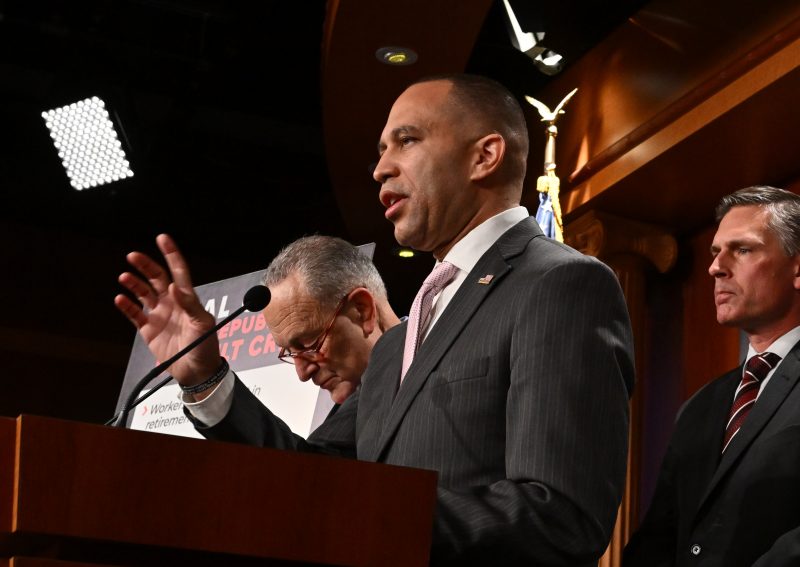There are 213 Democrats in the House. A previous version of the story said 212.
House Democrats began a process Tuesday that could allow them to bypass the chamber’s Republican leaders in passing legislation to raise the nation’s debt ceiling — if they can get a handful of GOP members to join the effort.
In a letter to colleagues, House Minority Leader Hakeem Jeffries (D-N.Y.) said the maneuver “preserves an important option” as a standoff continues between the White House and House Republicans ahead of a looming default on U.S. debt as early as June 1.
Jeffries said Democrats had crafted a “special rule” that could allow a bipartisan measure to be considered on the House floor through use of a so-called “discharge petition” — a procedure that is cumbersome, time-consuming and rarely successful. Such a petition would require 218 votes to discharge, or release a bill from committee, to start the process for a vote in the full House.
Several top Democratic lawmakers and aides have privately said that the discharge petition is not their preferred method of preventing a default, with many describing it as the absolute final option, to be used hours before a default would occur, if the White House and congressional leaders cannot strike a deal.
The first date Democrats could gather signatures for the discharge petition is May 16. To succeed, Democrats would need at least five Republicans to buck their party leadership, assuming all Democrats in the chamber back the effort.
While several Democrats familiar with the negotiations expect a majority in the conference to sign onto the discharge petition in two weeks, not all 213 Democrats are on board, according to three senior Democratic aides who spoke on the condition of anonymity to discuss private whip counts. It complicates the math on how many Republicans the minority party would need to win over, especially when there is no bill to discharge.
“We will be in direct contact next week upon our return to Washington in connection with the discharge effort,” Jeffries wrote to lawmakers, who are out on recess this week.
Last week, the House narrowly passed a bill backed by GOP leadership that would condition raising the debt limit on enacting deep spending cuts and rolling back several of President Biden’s legislative priorities. Four Republicans voted against the bill. All of them are far-right conservatives who would not sign onto a Democratic-led effort.
Biden and congressional Democratic leaders are pushing for a “clean” bill that raises the limit without conditions, as Congress did three times during the previous Republican administration of President Donald Trump.
But Democratic lawmakers and aides in both chambers privately admit that support for a straightforward increase does not exist, raising the expectation that Democrats will have to negotiate with Republicans on spending reductions to strike a deal that prevents the U.S. from defaulting.
House Democratic leaders, the top Democrats on committees and key rank-and-file members began to discuss the possibility of a discharge petition as a fail-safe option in the days after watching House Republicans struggle to elect Kevin McCarthy (R-Calif.) as speaker in January. McCarthy was elected on the 15th ballot after days of bitter GOP infighting.
Their inability to quickly come to a consensus on their leader indicated to Democrats that an equally treacherous and unpredictable fight could unfold ahead of the debt ceiling debate, according to people familiar with the negotiations. It was decided that Rep. Mark DeSaulnier (D-Calif.) would introduce the “Breaking Gridlock Act” to all House committees at the end of January to give the discharge motion time to “ripen” before it could be deployed under House rules.
The bill’s text can be replaced at any time with legislation that could lift the debt ceiling.
“Congress must urgently pass legislation to raise the borrowing limit and avoid plunging our nation into a recession, driving up unemployment and crashing the stock market,” Jeffries wrote in his letter Tuesday. “A dangerous default is not an option. Making sure that America pays its bills — and not the extreme ransom note demanded by Republicans — is the only responsible course of action.”
If Democrats were to succeed in the House, the party would also need some help from Republicans in the narrowly divided Senate, where 60 votes are required to advance most legislation under filibuster rules.
The House GOP legislation seeks to cap discretionary spending at fiscal year 2022 levels and allows 1 percent growth per year going forward. Republican leaders have said the cuts would not be applied across the board — but it would be left to the appropriations process in coming years to determine what exactly is cut.
On the Senate floor Tuesday, Majority Leader Charles E. Schumer (D-N.Y.) suggested that McCarthy cannot get the support of 218 Republicans to pass a Senate-approved bill that would significantly change the measure the House passed last week, claiming McCarthy is “boxed in” by the staunchly conservative House Freedom Caucus.
Schumer also told reporters that a short-term increase makes no sense. “I believe we should go for the full two-year extension,” he said.
Republican lawmakers involved in the ongoing negotiations have privately admitted that many of the cuts in their bill would not be realistically achievable, making it difficult to say how many Republicans would end up voting for a final debt ceiling bill.
If their legislation were to become law, Republicans would eventually need to identify more than $3.5 trillion in cuts over the coming decade. The Biden administration has estimated cuts of more than 20 percent would be required from most agencies.
Schumer has labeled the House bill “dead on arrival,” and Biden has threatened to veto to it if it somehow did pass in the Senate.
Biden has summoned congressional leaders to the White House next week to discuss the situation. Senate Minority Leader Mitch McConnell (R-Ky.) said Tuesday that he would attend the meeting, joining McCarthy, Schumer and Jeffries.
McConnell stressed that Biden and McCarthy “need to reach an agreement to get us past this impasse.” The Republican leader, who has played an outsize role in high-stakes debt negotiations in the past, made it clear that he would not this time. “There is no solution in the Senate,” McConnell said.
White House press secretary Karine Jean-Pierre insisted Tuesday that Republicans drop their demands.
“It is Congress’s constitutional obligation to act, not hold the full faith and credit of the United States hostage unless we allow them to make cuts to programs hard-working Americans rely upon. Threatening to default and crash the economy unless the president agrees with Speaker McCarthy’s entire agenda isn’t just unreasonable. It’s dangerous,” Jean-Pierre told reporters at the daily briefing.
She said that at next week’s meeting, Biden will make clear that he remains willing to have “a separate process” to talk about spending priorities.
“He is not going to negotiate on the debt ceiling,” Jean-Pierre said.



























